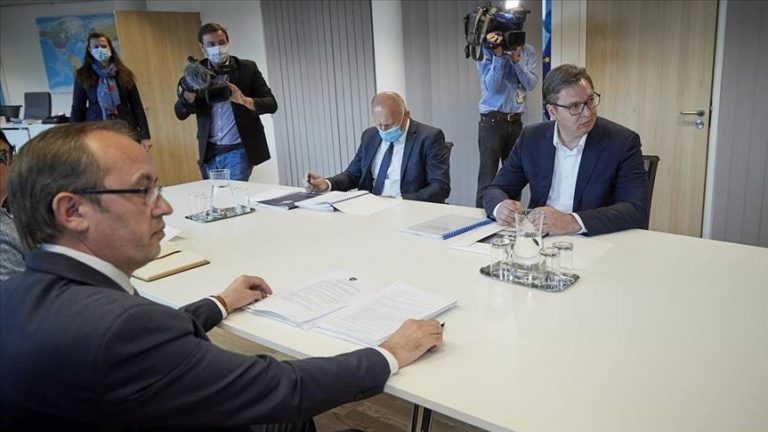Whenever Serbian President Aleksandar Vucic needs a card to arouse nationalist sentiment in Serbia, he uses the Kosovo card. He also used this card recently during a visit where the military operational capabilities of the Serbian army were presented at the Guard House in Topcider.
After declaring that Serbia should return compulsory military service due to Kosovo, Vucic also presented capital projects in the reconstruction of NATO-bombed military targets during the intervention in the 1998-1999 conflict between Kosovo and Serbia. Even Vucic’s rhetoric towards NATO was very impolite “I want to destroy the traces of NATO crimes” he had declared in front of the Serbian military forces, forgetting that Serbia was the initiator of the recent conflicts and wars that were caused in the Balkans.
First of all, the Serbian army needs a profound reform, in all possible directions, because the Serbian army is still developed by the spirit of ex-servicemen who have already become lecturers and who previously committed genocide in the Balkans. Another issue that is seen as problematic for the future of Serbia aspiring to join the European Union, is the military and economic cooperation with Russia and China. Serbia holds ties much more with communist countries than with the European Union.
As Moscow supplies Serbian armed forces with weapons and fighter jets, this is causing concern among Serbia’s neighbors, who are NATO allies or seeking to become members of the Western military alliance. Although Serbia is one of the Western Balkan countries aspiring to EU membership, the Euro-pessimistic rhetoric continues, despite receiving 100s of millions of dollars from the EU.

On the other hand, Vucic considers Kosovo as a geopolitical problem of the great powers and as a place where their interests crash, “You know what problems we have in Kosovo and Metohija, we have other regional problems, along with the third type of problems, which concern the geopolitical disputes of the great powers, and where we are often the country around which their interests clash”, Vucic said. He had made such a frivolous statement at the same meeting at the Guard House before the armed forces.
Pandemic management in Serbia and assistance from China and Russia
Another issue that provokes conflict in Kosovo is the vaccination program against COVID19 by Serbia. It is known that from the beginning of the pandemic, China offered Serbia a donation of emergency medical equipment and sent them straight from Beijing by train to Belgrade. This is not China’s only aid to Serbia since the beginning of the pandemic. It had also helped Serbia in the field of security in 2020, equipping the Serbian army with military drones.
Serbia has also recently received 40,000 doses of Russian Sputnik V vaccine, and in this program President Vucic stated that the first to receive the vaccine are citizens in North Mitrovica[1]. This is a “political dose vaccine” that Vucic uses for domestic consumption in Serbia and the Kosovo authorities were not notified about this act. This is another provocation by Serbia in relation to Kosovo, opening another dispute between the two countries. In Kosovo, investigations have already begun for the illegal entry of vaccines and unauthorized vaccination of Kosovo citizens.
In fact, Vucic’s statements in relation to Kosovo in the past and today continue to be “initiators of the conflict”, he had stated at the end of last year that if attempts at compromise with Kosovo fail, a Nagorno-Karabakh-type conflict could occur in Kosovo.
With these statements, President Vucic and his ruling party (SNS [2]) clearly see that they want even more power, and this is expressed at a high level in Serbia and in the suffocation of civil liberties, the judiciary and the freedom of the media. Such statements are not in the interest of normalizing relations between the two countries and that the European Union should react in such cases.
Serbia is known to have a violent past, and states that have such a past tend to become even more violent in terms of the path to an authoritarian system. And if Serbia’s deviation towards authoritarianism continues, this issue could become a major obstacle to its accession to the European Union, for which 2025 has been mentioned as a possible date.

Read also: Serbia’s war against Kosovo is asymmetric
In recent years, Belgrade has seen the acceleration of defense spending as it seeks dominance in the Western Balkans while maintaining good relations with China and Russia and on the other hand seeks EU membership using its membership funds.
[1] North Mitrovica is a Kosovar municipality on the border with Serbia, mainly inhabited by Serbs and members of other ethnicities such as: Albanians, Bosniaks, Roma, Ashkali, etc.
[2] The Serbian Progressive Party, which has been the ruling party in Serbia since 2012
Author
-

Kosovo based analyst that focuses on current affairs, communication and technology. She studied Albanian Literature, and Economics, Management and Information Sciences. MA in Journalism and Communication. Co-authored the Worlds of Journalism Study report on Kosovo Journalists.
View all posts




